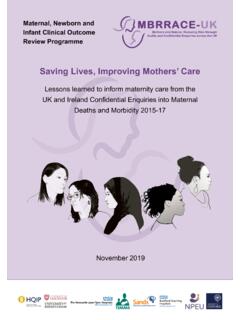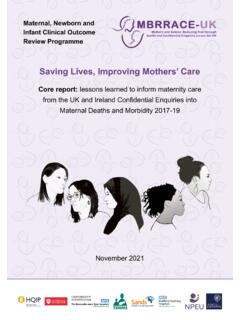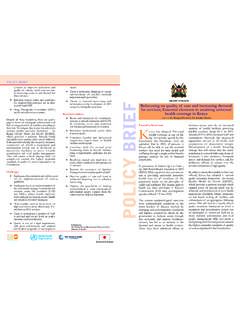Transcription of Saving Lives, Improving Mothers’ Care - NPEU
1 Maternal, Newborn and Infant Clinical Outcome Review Programme Saving Lives, Improving Mothers'. Care Lessons learned to inform maternity care from the UK and Ireland Confidential Enquiries into Maternal Deaths and Morbidity 2016-18. December 2020. Maternal, Newborn and Infant Clinical Outcome Review Programme Saving Lives, Improving Mothers' Care Lessons learned to inform maternity care from the UK and Ireland Confidential Enquiries into Maternal Deaths and Morbidity 2016-18. Marian Knight, Kathryn Bunch, Derek Tuffnell, Judy Shakespeare, Rohit Kotnis, Sara Kenyon, Jennifer J Kurinczuk (Eds.). December 2020 . Funding The Maternal, Newborn and Infant Clinical Outcome Review Programme, delivered by MBRRACE-UK, is commis- sioned by the Healthcare Quality Improvement Partnership (HQIP) as part of the National Clinical Audit and Patient Outcomes Programme (NCAPOP). HQIP is led by a consortium of the Academy of Medical Royal Colleges, the Royal College of Nursing, and National Voices.
2 Its aim is to promote quality improvement in patient outcomes. The Clinical Outcome Review Programmes, which encompass confidential enquiries, are designed to help assess the quality of healthcare, and stimulate improvement in safety and effectiveness by systematically enabling clinicians, managers, and policy makers to learn from adverse events and other relevant data. HQIP holds the contract to commission, manage, and develop the National Clinical Audit and Patient Outcomes Programme (NCAPOP), comprising around 40 projects covering care provided to people with a wide range of medical, surgical and mental health conditions. The Maternal, Newborn and Infant Clinical Outcome Review Programme is funded by NHS England, NHS Wales, the Health and Social Care division of the Scottish government, The Northern Ireland Department of Health, and the States of Jersey, Guernsey, and the Isle of Man.
3 Design by: Sarah Chamberlain and Andy Kirk Cover Artist: Tana West Printed By: Oxuniprint This report should be cited as: Knight M, Bunch K, Tuffnell D, Shakespeare J, Kotnis R, Kenyon S, Kurinczuk JJ (Eds.) on behalf of MBRRACE-UK. Saving Lives, Improving Mothers' Care - Lessons learned to inform maternity care from the UK and Ireland Confidential Enquiries into Maternal Deaths and Morbidity 2016-18. Oxford: National Perinatal Epidemiology Unit, University of Oxford 2020. ISBN: 978-1-8383678-0-0. Individual chapters from this report should be cited using the format of the following example for chapter 4: Vause S, Clarke B, Knight M and Nelson-Piercy C on behalf of the MBRRACE-UK indirect chapter-writing group. Messages for the care of women with medical and general surgical disorders. In Knight M, Bunch K, Tuffnell D, Shake- speare J, Kotnis R, Kenyon S, Kurinczuk JJ (Eds.)
4 On behalf of MBRRACE-UK. Saving Lives, Improving Mothers' Care - Lessons learned to inform maternity care from the UK and Ireland Confidential Enquiries into Maternal Deaths and Morbidity 2016-18. Oxford: National Perinatal Epidemiology Unit, University of Oxford 2020: p36-42. 2020 Healthcare Quality Improvement Partnership and National Perinatal Epidemiology Unit, University of Oxford MBRRACE-UK - Saving Lives, Improving Mothers' Care 2020. Foreword I am delighted as President of the Faculty of Public Health to have been invited to do the Foreword to this important report. The MBRRACE-UK Confidential Enquiries into Maternal Deaths and Morbidity have highlighted before the dispari- ties in outcomes for women from different ethnic minority groups. This year's coronavirus pandemic has brought this disparity even more starkly to the fore, and we must not lose sight of the actions that are required to address systemic biases that impact on the care we provide for ethnic minority women.
5 However, what these MBRRACE-UK reports continue to highlight are the multiple and complex problems that affect women who die in pregnancy social, physical and mental. Women who live in more deprived areas continue to be at greater risk of dying during or after pregnancy, and many of the complex factors underlying this increased risk need action much more widely than in maternity services, and beyond the health sector, and often long before preg- nancy. We will need to address this challenge of wider system actions in order to reduce deaths of women during or after pregnancy as well as their babies. Clear examples jump out which emphasise the importance of wider public health actions. More than half of women who die are overweight or obese we need actions in schools, communities and by governments to reduce our obesogenic environment and address weight management before women enter pregnancy.
6 Linked to this, cardiac disease mostly acquired, remains the leading cause of women's deaths during and after pregnancy. This need for action beyond maternity services is picked up by the recurring need identified in these reports for pre- pregnancy counselling. This should include not only optimisation of medication for pregnancy, but also culturally appropriate lifestyle advice to help optimise pregnancy outcomes. The statistically significant increase in maternal deaths from SUDEP sudden unexpected death in epilepsy alongside new guidance on valproate use in women of reproductive age - emphasises the importance of effective pre-pregnancy medication adjustment. This applies equally to women with pre-existing mental health problems maternal suicide remains the leading direct cause of maternal death between six weeks and a year after the end of pregnancy. The deaths of women from epilepsy emphasise the importance of joint working across both health and social care sectors to make sure simple actions such as access to accommodation with a shower can be instigated to reduce women's risk.
7 The infographic summary alongside this report emphasises the constellation of biases' affecting the care of women with multiple and complex problems spanning different health and social care sectors. Siloed systems represent structural biases preventing women receiving the care they need. To these biases we must add the misconception that actions to prevent maternal deaths can only take place within maternity services. Wider public health actions are equally important and I commend the authors' of the report for ensuring this is an area of focus. Professor Maggie Rae, PrFPH, FRSPH, FRCP (Hon) FRSM. President, Faculty of Public Health MBRRACE-UK - Saving Lives, Improving Mothers' Care 2020 i Key messages from the report 2020. In 2016-18, 217 women died during or up to six weeks after pregnancy, from causes associated with their pregnancy, among 2,235,159 women giving birth in the UK.
8 Women per 100,000 died during pregnancy or up to six weeks after childbirth or the end of pregnancy. We need to talk about SUDEP Epilepsy and stroke 13%. Act on: 29 women to prevent Sudden Unexpected Night-time Uncontrolled Ineffective Death in seizures seizures treatment EPilepsy 50 women A constellation of biases Cardiac 566 women died during 510 women (90%) disease 23%. or up to a year after had multiple pregnancy in the UK problems and Ireland Overweight or obese Known 33 women heart 281 disease 16. Delayed antenatal Blood clots 15%. Smoking care Aged 177 over 35. 107. 210. Physical health problems Known to 342. social Mental 28 women services Pregnant health 131 or in the year conditions 13%. Minority post-pregnancy ethnic group 566 Previous Mental pregnancy health 119. problems problems Live in 209 198 23 women deprived Non UK. areas citizen 168 52. Unemploy- Sepsis 11%.
9 Ment 94 Domestic Non abuse English speaking Born 61 20 women 22. outside UK Bleeding 9%. 216. Other physical 15 women conditions 7%. Systemic Biases due to pregnancy, health and other Cancer 3% 6 women issues prevent women with complex and multiple 4 women Pre-eclampsia 2%. problems receiving the care they need Other 4% 9 women ii MBRRACE-UK - Saving Lives, Improving Mothers' Care 2020. Executive Summary Introduction This report, the seventh MBRRACE-UK annual report of the Confidential Enquiry into Maternal Deaths and Morbid- ity, includes surveillance data on women who died during or up to one year after pregnancy between 2016 and 2018. in the UK. In addition, it also includes Confidential Enquiries into the care of women who died between 2016 and 2018 in the UK and Ireland from epilepsy and stroke, general medical and surgical disorders, anaesthetic causes, haemorrhage, amniotic fluid embolism and sepsis.
10 The report also includes a Morbidity Confidential Enquiry into the care of women with pulmonary embolism. Surveillance information is included for 547 women who died during or up to one year after the end of pregnancy between 2016 and 2018. The care of 34 women with pulmonary embolism was reviewed in depth for the Confiden- tial Enquiry chapter. This report can be read as a single document; each chapter is also designed to be read as a standalone report as, although the whole report is relevant to maternity staff, service providers and policy-makers, there are specific clini- cians and service providers for whom only single chapters are pertinent. There are seven different chapters which may be read independently, the topics covered are: 1. Surveillance of maternal deaths 2. Neurological conditions 3. Medical and general surgical disorders 4. Anaesthesia 5. Morbidity from pulmonary embolism 6.





